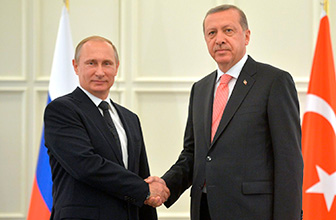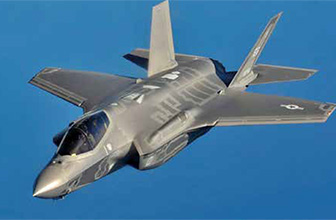
The EU Will Not Act as a Counterweight to Russia in Either Armenia or NKR  By Benyamin Poghosyan, PhD, Chairman, Center for Political and Economic Strategic Studies
By Benyamin Poghosyan, PhD, Chairman, Center for Political and Economic Strategic Studies
The EU is neither willing nor capable of countering Russia or Turkey in Armenia and Azerbaijan and will not make efforts to decrease Russian influence in Armenia and the unrecognised Nagorno Karabakh Republic.
EU-Armenia relations entered a new phase in 2009 when the EU launched its Eastern Partnership Initiative. Armenia successfully negotiated an Association Agreement with the EU and was going to sign it in autumn 2013. The growing tensions between Russia and the West forced Armenia to cancel the signature, not to ruin relations with its strategic ally. Armenia and the EU started a new round of negotiations in late 2014, culminating with the signature of the Comprehensive and Enhanced Partnership Agreement (CEPA) in November 2017. READ MORE
- EGF Editor |
Published on EGF: 05.05.2021
| External Relations
-
The Realistic Policy of Armenia towards Nagorno-Karabakh  By Benyamin Poghosyan, PhD, Chairman, Center for Political and Economic Strategic Studies
By Benyamin Poghosyan, PhD, Chairman, Center for Political and Economic Strategic Studies
The 2020 Karabakh war has dramatically changed the geopolitical status quo in the South Caucasus. Discussions have been underway in Armenia and the Armenian Diaspora about the reasons for the catastrophe and those responsible. Most probably, military defeat will be a key topic during the upcoming June 2021 snap parliamentary elections. The thorough analyses of what happened before, during, and after the war are mandatory tasks to be fulfilled. However, the key for Armenia now to elaborate a new policy towards the Karabakh conflict, taking into account the war results. The most significant issue here is to develop a realistic policy based on accurate calculations, Armenia’s resources, and the interests of external players; otherwise, Armenia may face another catastrophe. READ MORE
- EGF Editor |
Published on EGF: 28.04.2021
| External Relations
-
Beijing’s Long Road to the Gulf Region  By Fuad Shahbazov, Baku-based independent regional security and defence analyst
By Fuad Shahbazov, Baku-based independent regional security and defence analyst
Energy cooperation has been a key aspect of growing bilateral cooperation between China and the Arab states of the Gulf region for the past several years. Since 1996, China has become a net importer of crude oil and, as the second‑largest energy consumer in the world after the United States, is now the third‑largest importer of oil after the United States and Japan. Therefore, it should not come as a surprise that China is eying a deep and strategic partnership with the states of a region that sits on top of the world’s largest proven crude oil and natural gas reserves. READ MORE
- EGF Editor |
Published on EGF: 17.04.2021
| External Relations
-
Russian-Turkish Relations: Moscow Calls the Tune  By Eugene Kogan, Tbilisi-based defence and security expert
By Eugene Kogan, Tbilisi-based defence and security expert
The relationship between Russia and Turkey is an unequal one. Turkish President Recep Tayyip Erdoğan does not like playing second fiddle in the Russian-Turkish orchestra, conducted by Russian President Vladimir Putin. However, at every twist and turn, Putin holds more leverage over Erdogan than the other way around.
Putin will cooperate with Turkey as long as it suits Russian interests. He would quickly end the relationship if Turkey were to turn against him and tried to return to the Western fold from which it has drifted away ever since the failed coup on 15 July 2016. Erdoğan is aware of this and, as a result, is leading Turkey ever deeper into the Russian fold since the European Union, the United States and NATO all remain suspicious of him and his administration’s goals and are simply unwilling to assist him in his various military activities in Libya, Syria and, most recently, in the South Caucasus. READ MORE.
- EGF Editor |
Published on EGF: 17.04.2021
| External Relations
-
Russian Goals in the Armenian Snap Parliamentary Elections  By Benyamin Poghosyan, PhD, Chairman, Center for Political and Economic Strategic Studies
By Benyamin Poghosyan, PhD, Chairman, Center for Political and Economic Strategic Studies
Armenia is actively preparing for the 20 June 2021 snap parliamentary elections. Political parties are making their final calculations regarding the format of their participation. The main battle will probably occur between the incumbent prime minister, Nikol Pashinyan, and the second president of Armenia, Robert Kocharyan. The latter has already confirmed that he will lead an alliance of two or three parties. The Armenian Revolutionary Federation, the “Motherland” party, established by the former director of the National Security Service, Artur Vanetsyan, and the new “Rebirth Armenia” party established by the former governor of the Syunik region, Vahe Hakobyan, which unites several mayors from the Syunik, may create an electoral bloc under the leadership of Robert Kocharyan. READ MORE
- EGF Editor |
Published on EGF: 14.04.2021
| External Relations
-
A Vote Largely Motivated by Hate in Armenia’s June ‘21 Elections  By Benyamin Poghosyan, PhD, Chairman, Center for Political and Economic Strategic Studies
By Benyamin Poghosyan, PhD, Chairman, Center for Political and Economic Strategic Studies
Former president Robert Kocharyan has emerged as the strongest challenger to prime minister Nikol Pashinyan in Armenian’s forthcoming parliamentary elections. However, most voters are simply motivated by their hate of one or the other.
Armenia is looking forward to the snap parliamentary elections scheduled for June 20, 2021. According to the preliminary agreement between the ruling "My step" faction and the two parliamentary opposition parties, prime minister Nikol Pashinyan will resign at the end of April, beginning of May; Parliament will not elect a new prime minister twice; and will thereafter be automatically dissolved as provided for by the Armenian constitution. READ MORE
- EGF Editor |
Published on EGF: 07.04.2021
| External Relations
-
Searching for the Right Formula for South Caucasus Regional Co-operation  By Fuad Shahbazov, Baku-based independent regional security and defence analyst
By Fuad Shahbazov, Baku-based independent regional security and defence analyst
President Erdogan’s initiative for a 3 + 3 regional co-operation format in the South Caucasus offers the possibility of opening up the region through an extensive network of land corridors. Not everyone has welcomed the initiative, but the prospect of turning a fragile region into a beacon of stability after a long period of instability and violence is a worthy aspiration.
The second Karabakh war has shifted the geopolitical and geo-economic realities in the South Caucasus region, particularly heightening the possibility of competition over the region’s transport corridors. The Moscow-brokered ceasefire agreement signed on 10 November brings with it the possibility of opening a number of transit routes, which have been closed for almost 30 years. In the aftermath of the Armenian forces' devastating defeat in the 44-day war, the idea of regional co-operation becomes increasingly important. READ MORE
- EGF Editor |
Published on EGF: 31.03.2021
| External Relations
-
Snap Parliamentary Elections are Unlikely to Resolve Armenia’s Political Gridlock  By Benyamin Poghosyan, PhD, Chairman, Center for Political and Economic Strategic Studies
By Benyamin Poghosyan, PhD, Chairman, Center for Political and Economic Strategic Studies
Armenia appears heading for snap parliamentary elections on 20 June, but hopes that the poll may resolve the current gridlock in the Armenian political arena may be premature. For Armenia, things may get worse before they get better.
A tense political crisis has been ongoing in Armenia since immediately after the signing of the 10 November, 2020, trilateral statement on Nagorno Karabakh. That same night, angry protestors stormed the building of the Government and the Parliament, and the National Assembly's Speaker was physically attacked, resulting in him spending a month in the hospital. However, these actions did not lead to the resignation of Prime Minister Nikol Pashinyan. He took refuge in a Ministry of Defence bunker for a week, and there was no organised opposition that could take power while the Prime Minister was absent from the political scene. READ MORE
- EGF Editor |
Published on EGF: 24.03.2021
| External Relations
-
US-Turkey Relations: CAATSA and Beyond  By Eugene Kogan, Tbilisi-based defence and security expert
By Eugene Kogan, Tbilisi-based defence and security expert
US-Turkey relations have a history of challenges in general but with the ascent of Prime Minister Recep Tayyip Erdogan in 2001, the challenges reached their peak with the failed coup of 15 July 2016 that Erdogan blamed on the US-based cleric, Fethullah Gulen.
By becoming the first elected executive President of Turkey, Erdoğan has also transformed Turkey from a secular, democratic and reliable Western allied regime guarding NATO’s South-Eastern flank to an Islamic, nationalist and autocratic regime. Erdoğan’s policy is undermining the foundation of US-Turkey relations. This article outlines three cases that highlight the undermining of this relationship: S-400 vs. F-35; Halkbank; the Turkish citizens working at the US Consulate General becoming targets of politically-motivated legal charges. READ MORE.
- EGF Editor |
Published on EGF: 17.03.2021
| External Relations
-
In US–Iran Relations Compromise Is both Possible and Probable  By Benyamin Poghosyan, PhD, Chairman, Center for Political and Economic Strategic Studies
By Benyamin Poghosyan, PhD, Chairman, Center for Political and Economic Strategic Studies
Iranian hardliners are mostly rational political actors who are not ready to sacrifice Iran's security, and their own power, for the sake of ideological animosity towards the US or Israel. Therefore, even if a hardliner won next June’s presidential election in Iran compromise with the US on the nuclear file would be not only possible, but probable. This would be in the interest of both the US and Iran, as well as the entire Middle East region.
Relations with Iran are among the top priorities for the Biden administration. Since President Trump withdrew the US from the Iran nuclear deal and imposed new sanctions in May 2018, Washington and Tehran have been on a collision course. Iran's decision to start to break some of the deal’s requirements in May 2019, and the assassination of General Qasem Soleimani in January 2020, added fuel to bilateral animosity. READ MORE
- EGF Editor |
Published on EGF: 09.03.2021
| External Relations
-
